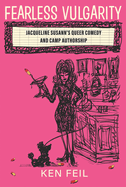
When Jacqueline Susann died at age 56 in 1974, The Guinness Book of World Records declared her first novel, Valley of the Dolls, the bestselling novel in the world. Her undisputed popularity with readers was matched by the hostility critics heaped upon her. Ken Feil (Dying for a Laugh) skillfully rehabilitates her critical reputation with this persuasive reevaluation of her work, which undermines the sanitized wholesomeness of Hollywood heterosexual romance with a "comedy of bad manners." As Feil notes in Fearless Vulgarity: "Overlooking humor in Jackie Susann's work negates the core of her queer, feminist agency and the complicated delights her bestsellers furnished."
The first two chapters examine Valley of the Dolls and The Love Machine, the latter being Susann's only novel with a happy ending. Feil then looks at how Susann tweaked and challenged taste and gender norms and was "the product of numerous closets." Only in her novels could she write about her bisexuality, non-monogamous marriage, being Jewish, having an autistic son, managing addictions and living with breast cancer. Feil also examines several biographical movies and plays about Susann, including Paul Rudnick's Isn't She Great and Michele Gallery's Scandalous Me. The final chapter looks at the legacy of Susann's sensibility, most notably in Sex and the City, Lee Daniels's TV series Star and the work of Carrie Fisher. Fisher's heroine in Postcards from the Edge is named Suzanne Vale, a playful combination of Susann and valley.
Feil expertly exposes how Susann planted her most subversive material and queer insights into the margins of her novels. This is literary criticism at its most eloquent, impressively researched and saucy. --Kevin Howell, independent reviewer and marketing consultant

